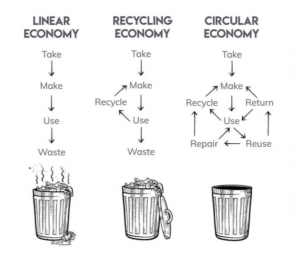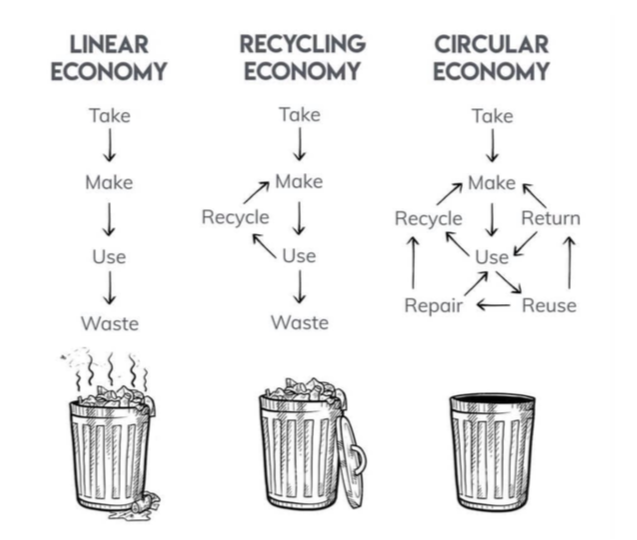 I am Katerina Chantzi and I am a social scientist. I am very excited to be an intern at Social Enterprise Estonia during my studies at Tallinn University in Social Entrepreneurship Master’s Programme. I started my internship in June 2020, a time when we were slightly starting to get out of our lockdown “caves” and looking for human interactions. All the colleagues that I was looking forward to meeting and working together in the same place became fascinating squares on my screen on a weekly basis full of creativity, interaction, knowledge and passion to find ways to make this world a better place.
I am Katerina Chantzi and I am a social scientist. I am very excited to be an intern at Social Enterprise Estonia during my studies at Tallinn University in Social Entrepreneurship Master’s Programme. I started my internship in June 2020, a time when we were slightly starting to get out of our lockdown “caves” and looking for human interactions. All the colleagues that I was looking forward to meeting and working together in the same place became fascinating squares on my screen on a weekly basis full of creativity, interaction, knowledge and passion to find ways to make this world a better place.
I am very excited and proud of this internship, as my supervisor Helen Mikkov gave me the opportunity to utilise my previous experience and knowledge, encouraging me to discover new paths (by participating in Climate KIC Journey, get in contact with enterprises that are in the network etc.) that would help me to find out what contribution I would like to have in the world and make steps towards that. In the meanwhile, I am running my company, called BinFree, where we offer recycle pick up services in Estonia to facilitate the recycling process for consumers and recycling companies by measuring the environmental impact of both and give practical information to move towards a greener lifestyle and give private consultations to companies and individuals to reduce their environmental impact in their daily life with little effort.

My experience from the education sector, my studies and actions in social policy in different countries, in combination with my national culture (Greek) that taught me through its ancient literature and drama to live my life by keeping in mind my posthumous fame (“υστεροφημία”) and make decisions throughout my life keeping in mind how I would like to be remembered after I pass out from this life and considering their impact on myself, people around me and the environment around me during my life, made me realise that my mission in this life is to bring people together to act collectively, to help each other in order to increase theirs and other peoples’ happiness by increasing their quality of life. The COVID-19 outbreak is a great example of human responsiveness when in danger regardless of social differences (in front of a virus everyone is vulnerable regardless of social status and wealth), people got together, worked together and acted instantly, responsively and effectively in order to defeat the impending danger. How we respond to the main danger that is threatening us, was created by us and we still feed it, called climate change and how we can defeat it?
By having inefficient state mechanisms to solve social and environmental problems due to shortage of funding, as they considered as unproductive sectors to invest for economic growth due to the fact that they require an interdisciplinary approach, time, expertise, effort to give results and they reveal the vulnerabilities of the dominant social, economic, political system and a dominant neoliberal ideology that influences every sort of today’s policies and politics and has a big negative impact on society and the environment, as it creates short-term financial profits without considering the long term social and environmental impact, there is need to find solutions that protect life and not cold cotton, polymer or paper banknotes.
Social enterprises are a great response to the dominant economic system and its characteristics, as are more flexible in their operations, are social aim driven without losing their business character, are able to combine and bring together key actors from different sectors (either private or public) and try to make a change in the current system without breaking it but reshaping its core. I could characterise social enterprises as hybrid organisations that are born from social justice and economic growth and would lead us to the future of sustainability and long term by transforming the current economic system and push innovation and technology for social and environmental sustainability.
Climate change is a threat that we need to address as soon as possible, as we have very limited time to act and change our current economic system in terms of production, product design, product life cycle, world trade and product distribution, impact measurement in terms of societal and environmental footprint, resource management (materials and labour force), consumption patterns and social values regarding the way we consume. Social enterprises that are already active in the field of environmental sustainability, have a wide variety of opportunities to invade in those sub-systems and create innovative solutions. The decade 2020-2030 will be a transformative decade towards entrepreneurship and climate change and social enterprises need to take the lead on this, to promote social entrepreneurship, help the social groups that are mainly affected from climate change, either by directly employ them or offer them the possibility to develop relevant skills or by enhancing the current production and consumption system by intervening and creating innovative business models.

The main principle that social enterprises that work with environmental sustainability and climate change are that mainly they work with people that are not aware of the problem, are not experts and cannot relate with the problem and devote time to acknowledge the problem. There is no doubt that this creates a lot of obstacles, but at the same time is a great spectrum that can generate innovative solutions for how to educate, engage, motivate people to change their behaviour patterns, start thinking about their consumption habits and decisions, feel part of the problem and at the same time part of the solution by supporting social enterprises’ aims.
In parallel with that, social enterprises need to benefit from their flexibility, adaptability and expertise, and for their unique characteristic that they make a local impact with strengthening and empowering communities. In the post-COVID world (or even still COVID world) that everything takes place virtually, social enterprises need to connect with each other, communicate their aims, visions, missions and results and combine all these small incubators of social action in a big scheme that is accessible to everyone and introduce themselves to the world (besides their direct beneficiaries), create calls for action and show their overall impact. The more visible social enterprises are the bigger their influence and their impact and recognition.
Collaboration and communication need to happen not only among social enterprises but also with the businesses of the current system of production and consumption. Circular and sharing economy offers a range of possibilities and opportunities for social enterprises to discover and explore what can be created from waste, how logistics can have a less environmental impact and how the 5R’s (Refuse, Reduce, Reuse, Recycle, Rot) can be promoted, adapted and integrated as main practices in our daily lives, as mainstream practices. There is a need to strive from the “Take-make-use-waste” model to “take-make-use-reuse/repair/return/recycle” model and social enterprises have the flexibility to experiment in this transition by increasing the employability of certain social groups that contributes to social coherence, by raise awareness on these topics and present data and facts that people that are not familiar with the sector can relate with. For instance, investigate the environmental impact in terms of financial loss within the upcoming years for corporations.
To sum up, social enterprises cannot change the world alone, however, they can be the main actors in this transition and they need to create demand both to consumers and to providers/sellers/main actors in the current market. To achieve this successfully, they need to establish collaborations with stakeholders from the private, public and third sector, have a clear mission, engage people to their goal, explain the importance of what they do in ways that their target audience understands and have a great marketing strategy in place. National and international governments and organizations need to take some more steps forward and put in place besides financial indicators of growth (a great example is GDP), indicators of social growth. Sustainable Development Goals have achieved to have a common terminology around the globe for sustainable development and certain goals, but still, the call for action is at the discretion of the organization. Legal regulations, taxation and investment possibilities can promote initiatives that respond to climate change and environmental sustainability and offer incentives to social enterprises to increase their impact. COVID-19 world taught us that we can respond immediately and effectively for incidents that we consider as important. Let’s learn to act proactively, collaboratively, human-centred and with the responsibility to ourselves, live around us, our ancestors and our future generations.
© 2020 Sotsiaalsete Ettevõtete Võrgustik
This publication has been prepared within SENBS project No. 2020- 1-EE01-KA204-077999. The content of this publication is the sole responsibility of the project coordinator and may not always reflect the views of the European Commission or the National Agency.
















Your point of view caught my eye and was very interesting. Thanks. I have a question for you.
Thanks for sharing. I read many of your blog posts, cool, your blog is very good.